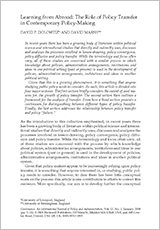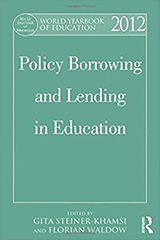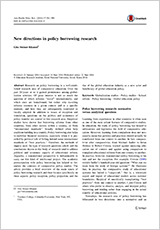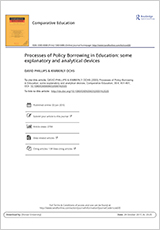교육정책의 비교연구
교육정책의 비교연구 (Comparative Studies in Education Policy) is focused on international education policy, international discourses about achievement (e.g., based on PISA or TIMSS), and notions of policy borrowing and transfer. In an increasingly globalizing world, ideas circulate and educational discourses also emerge globally regarding the reasons for the educational success of certain countries and/or the failure of others. This body of work is reflexive of such practices that happen on a superficial level, attempting to examine international educational discourses in a critical light. It also strives to solve some challenging domestic educational issues by seeking solutions through international cases. In particular, the temptation to model successful cases from abroad in a globalizing world is inevitable and happens quite often today. The flow of data, indicators, and benchmarks has created an education epidemic that has been compared to a contagious virus. Korea is particularly responsive to global discourses, as shown by some of the recent education reforms implemented to improve Korean education systems inspired from foreign (often Western) countries. It is thus critical to understand the reasons and consequences of such actions, which 교육정책의 비교연구 seeks to address.
Here are some examples of questions we ask:
- “How far can we learn anything of practical value from the study of foreign systems of education?” (Adam Sadler, 1990)
- Why do Korean policy-makers and educators like to talk about Western success cases? Which countries are most cited? Are these cases applicable to the Korean context?
- Have education systems across the world become more similar to each other? Why or why not?
- Is outcome-based high-stakes assessment affecting a large part of the world? Why?
- How can educational discourses become de-territorialized if they emerge from a unique cultural, socioeconomic, historic context?
- Why do we borrow policies and reforms from other countries? What are the consequences?
교육정책의 비교연구에 속하는 연구로는 국제교육정책, PISA(Programme for International Student Assessment)나 TIMSS(Trends in International Mathematics and Science Study)와 같은 자료를 활용한 국제비교 연구, 그리고 정책 차용이나 전이 등을 꼽을 수 있다. 세계화가 확산되면서, 교육 성공사례 혹은 실패사례를 거듭하는 국가들의 경험을 바탕으로 한 교육 담론이 형성되고 있다. 교육정책의 비교연구는 이러한 국제교육 담론을 비판적인 시각에서 분석하고, 국제적인 사례를 통해 국내 교육문제에 대한 해결책을 찾고자 한다. 특히, 오늘날 세계적으로 급변하는 지식기반 정보사회에서 외국의 교육 성공사례를 접하여 영감을 얻고, 이를 차용하고자 하는 것은 자연스러운 현상이다. 교육지표, 교육기준과 평가, 교육의 질, 역량 강화 등 키워드로 구성된 국제적인 교육 담론은 전 세계적으로 유행하는 교육개혁 전염병(epidemic)에 비유되기도 하였다. 한국은 특히, 최근에 시행된 교육개혁들이 반증하듯이, 외국(주로 서양)의 교육제도의 영향을 많이 받으며 세계적인 국제교육 담론에 민감하게 반응하여 왔다. 교육정책의 비교연구는 교육 정책 차용의 원인과 결과를 규명하고, 이러한 현상을 고찰하고자 하는 학문적 노력이다.
- “외국 교육제도에 대한 연구는 국내 교육 개선에 실질적인 도움을 줄 수 있을까?” (Adam Sadler, 1990)
- 왜 한국 정책 입안자들과 교육자들은 서양의 교육 성공 사례에 대해 담론화하기를 좋아하는가? 가장 많이 인용된 외국 사례 중에는 어떠한 것들이 있으며, 한국 상황에도 적용이 가능한가?
- 세계 각국의 교육제도는 시간이 지남에 따라 서로 유사해지는가? 이러한 현상을 어떻게 설명할 수 있을까?
- 전 세계적으로 학습성과 중심, 시험위주 교육평가는 어떻게 확산되고 있는가? 이유는 무엇인가?
- 특정 문화, 사회 경제, 역사적 맥락에서 형성된 교육 담론의 탈영토화 현상은 어떻게 일어나는가?
- 우리는 왜 다른 나라의 교육정책과 개혁을 차용하는가? 그 결과는 어떠한가?
Readings & Resources

Learning from Abroad: The Role of Policy Transfer in Contemporary Policy-Making
David P. Dolowitz and David Marsh | 2000
Processes of Policy Borrowing in Education: some explanatory and analytical devices
David Phillips and Kimberley Ochs | 2003

Learning from Abroad: The Role of Policy Transfer in Contemporary Policy-Making
David P. Dolowitz and David Marsh | 2000


